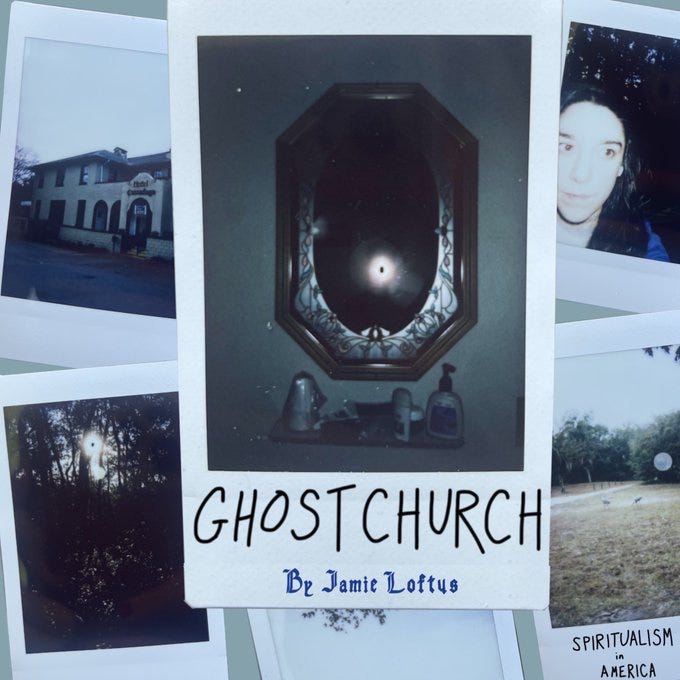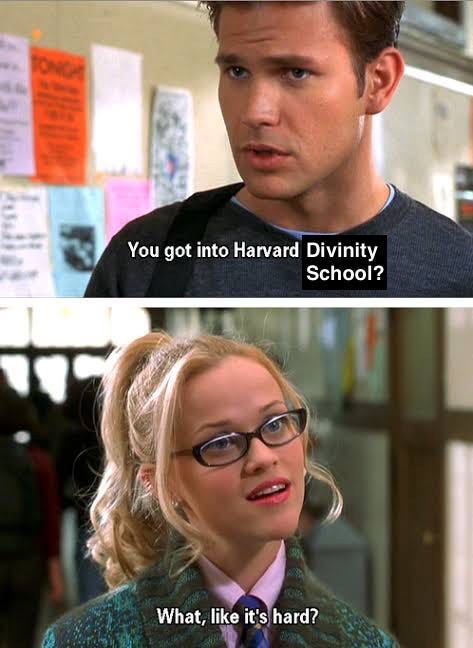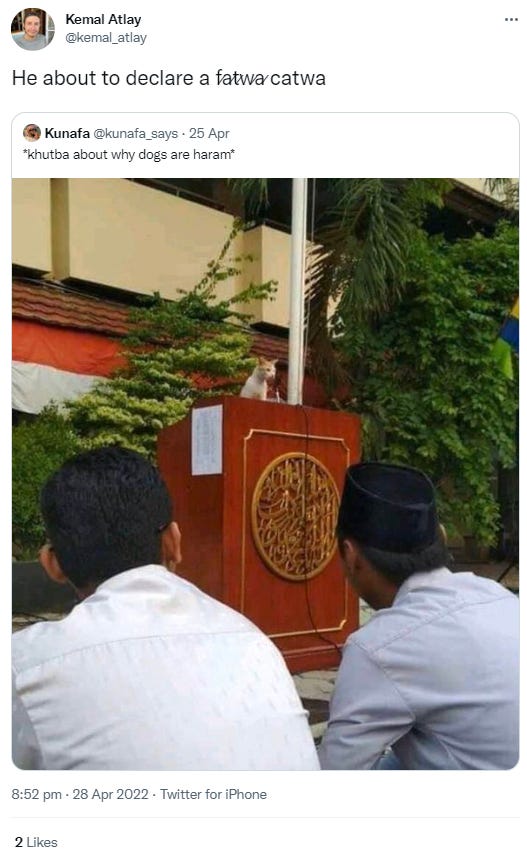Read this, watch this, listen to this
Also, think about this
Thanks to Fr Jim McDermott for giving me a shoutout in his newsletter — welcome to the new readers. Also, I now have another lovely quote to put on my about page!
We are coming up to a year of writing this newsletter, and I invite you to have a look at the archives. Please try and ignore the link rot – it’s happened much quicker than I was expecting and it’s the reason I screen shot most of the tweets now.
I’m going to take a slightly different tack with this edition and recommend a few things I’ve been enjoying around the web (but still interspersed with as many memes as Gmail will allow). I hope you enjoy.
One does not simply know when Eid is
Also, Spongebob would like to wish you a fabulous Eid. As previously discussed, Spongebob is a Muslim.
Weird Religion podcast

I am truly aghast nobody told me about the Weird Religion podcast, which was seemingly grown in a lab to appeal specifically to me. I found it two weeks ago and I’m making my way through the archives.
Hosted by Brian Doak and Leah Payne (both professors and pop culture tragics), its tagline is “Award-winning podcast for people who know religion is weird, but love it anyway”. Duh that’s me you are talking about me!
Most episodes are based around a pop culture artefact or event that reveals something weird and interesting about religion. If you are reading this newsletter, you will probably be into it too.
Ghost Church by Jamie Loftus

While we’re on the subject of podcasts, Jamie Loftus has a new show called Ghost Church which explores American Spiritualism in her usual gonzo style.
The second episode came out yesterday and it was very good! So far it reminds me a bit of her first show, My Year in Mensa, which I love. That’s where she explores the culture and personalities involved in the high-IQ Mensa society and inadvertently causes chaos by making the show.
Link is a Christian

You got into Harvard Law Divinity?

Phillip Picardi is the former digital editorial director for Them and Teen Vogue, and former editor-in-chief of Out. He is currently studying at Harvard Divinity School.
I subscribed to his newsletter Religiously Blonde in August last year in the hope I would get an inside look into what it’s like to go there, something I’ve always wanted to do but will probably never actually do.
As it turns out, getting a Masters of Religion and Public Life is a bit of a challenge and doesn’t leave much time for writing newsletters. Fair enough! But now the course is drawing to a close and Philip has begun publishing again, including this post about the time he went to the Met Gala when the theme was Heavenly Bodies: Fashion and the Catholic Imagination.
Thank you for tweeting this, Kemal

Some long reads about religion and computers

Big hat tip to James Hennessy for including these two articles in his April 8 edition of The Terminal. It took me a while to get around to reading them, but I’m glad I did!
The first is about Thomas Buchler, who developed TropeTrainer, a piece of software designed to aid Torah memorisation. Unlike subsequent programs that play recordings of voices, TropeTrainer was a true text-to-speech program able to adapt and sing the text in dozens of different traditions.
TropeTrainer was software that had been taught to sing the words of God.
Then it went silent.
The second is this semi-satirical article about the very real American Programmer Terry Davis, who claimed to receive instructions from God to build TempleOS — a new operating system that would serve as the third temple of Jerusalem.
TempleOS asserted that computing is not separable from religion. For Terry, the computer was a space of spiritual contemplation, a temple. The computer programmer was not a craftsman or a merchant. They were a priest, a prophet, and a monk. For Terry Davis, computing was a sacred activity.
I don’t think I agree with the foundational argument of the article (that religion is humanity’s operating system because it “structures your information environment”) but I appreciate what it’s doing and agree there’s a religious element to practically everything. Give it a read and maybe you’ll have some thoughts too.
You will literally never stop me posting these jokes

Everything Everywhere All at Once

Finally, I’m not saying anything new here, but Everything Everywhere All at Once is a very good film. Plus, it deals with nihilism and meaning-making as major themes. I recommend it! In fact, if you can go into the movie without watching any trailers or reading anything more about it, I’d recommend that too.
Ok a FEW more links:
- This post from Garbage Day by Ryan Broderick about how Catholic evangelists are using Tumblr’s new Blaze feature to push Jesus content onto the feeds of non-Catholic users. (Scroll down to ‘An Update On Tumblr Blaze’)
- The biggest *youth pastor voice* stretch you have yet seen (tweet)
- This clip from a grossout cartoon I think I watched when I was 18


